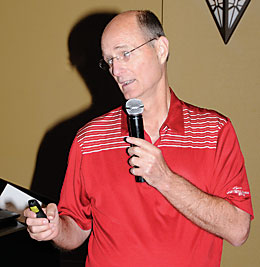 |
||||||||||||
|
2016 VVA Leadership & Education Conference, September/October 2016 Planning a Meeting or Convention? PRESENTED BY WES GUIDRY
That’s how Wes Guidry, VVA’s longtime one-person Meeting Planning Department, opened his seminar. When lots of hands immediately shot up, Guidry deadpanned: “Are you crazy?” When the laughter died down, Guidry got serious. He went on to present a step-by-step method for how to deal with the thousand and one details involved in setting up and running a VVA meeting or convention at the chapter, state, regional, or national level. “You have to really work,” he said, from the minute you start to prepare the meeting’s Request for Proposal (RFP) to the time you sign the contract, right through the minute-by-minute details of running the actual event on site. The first step, Guidry said, is to decide how many sleeping rooms you need to reserve (the “block”) for each night of the event in the hotel. You go, basically, on your history in previous events. That is not quite an exact science, he said. Sometimes you wind up going the “SWAG” route—making a scientific, wild guess. Next, the meeting planner must figure out how many and what size meeting rooms will be needed for the conference or convention’s sessions, along with the rooms’ audiovisual needs. These can be big-ticket items with plenty of options. Then the planner must deal with another potentially costly item: food and beverages. Several things to keep in mind in that area, Guidry said, are service charges and taxes, which can add more than 30 percent to the per-plate cost of a breakfast, luncheon, or dinner. And beware, he warned, of liquor liability clauses. The lesson there: Don’t go for a plan that offers unlimited alcohol. Guidry strongly suggested that meeting planners work closely with the local Convention and Visitors Bureau. “They will be your best friend during the planning process,” he said, pointing out that CVBs do not charge organizations because they work for the local city and its tourist and convention hotels. “Become friends with them,” Guidry advised. Among other things, CVBs will suggest hotels that would be suitable for particular conferences and will work with the meeting planner on the RFP. They will even send the RFPs to hotels that have the appropriate amount of space to bid on the event, then collect the proposals and bring them to the planner to review. After working with the planner to narrow down the list of acceptable hotels, the CVB people will arrange for site visits to each hotel. All meetings involve negotiations with hotels. Guidry advised caution and patience with that aspect of the process. “You have to be reasonable,” he said. “Ask. Don’t demand. Be professional, personable, presentable, and be friendly and nice. Remember, you’re dealing with human beings.” —Marc Leepson
|
||||||||||||
|
|
||||||||||||
|
||||||||||||
8719 Colesville Road, Suite 100, Silver Spring. MD 20910 | www.vva.org | contact us |
||||||||||||





















 “How many of you plan on planning a meeting?”
“How many of you plan on planning a meeting?”